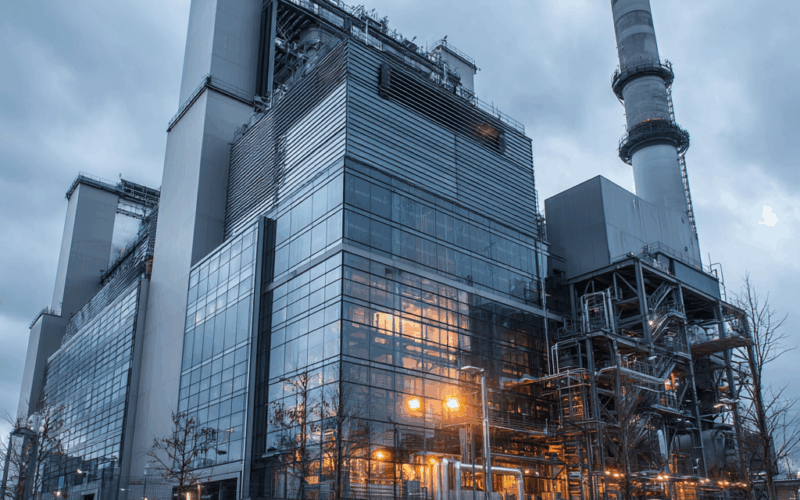In the modern world, stable power supply plays a key role in all areas of life – from everyday comfort to the operation of industrial enterprises and infrastructure facilities. With the growing demand for electricity and the simultaneous strengthening of environmental safety requirements, traditional power plants are increasingly proving to be insufficiently flexible and efficient. Therefore, the implementation of innovative solutions in the production and management of electricity is becoming a priority to ensure uninterrupted power supply in any conditions.
Modern technologies in the design of power plants
Modern power plants are built usingadvanced technologies, which can significantly increase the efficiency and environmental friendliness of electricity generation. The basis of such systems are renewable sources – solar panels and wind turbines, supplemented by energy storage systems, such as modern batteries. The use of innovative materials and production technologies helps to increase the reliability and service life of equipment, as well as reduce the costs of its maintenance and operation.
Intelligent control systemsand monitoring play an important role in optimizing the operation of the power plant in real time. They regulate the processes of energy generation and distribution depending on current conditions, thereby ensuring maximum efficiency and preventing possible failures. Due to their modularity and scalability, such power plants can be easily adapted to various tasks – from private homes and offices to large industrial facilities and remote settlements.
Autonomous systems and their advantages
Autonomous power plants are designed to operate independently of centralized power grids and have a number of important advantages:
- Independence from central infrastructure, which is especially important for remote and hard-to-reach regions.
- High reliabilitydue to the absence of the risk of disconnection due to failures in the general network.
- Reducing operating costsdue to the absence of costs for the transmission and distribution of electricity.
- Environmental safety, as renewable energy sources are often used.
- Flexibility and scalability, allowing the system to be adapted to the specific needs of the user.
These systems are especially in demand in country houses, research bases and at sites where connection to centralized networks is difficult or impossible. Modern batteries and intelligent control allow such installations to provide round-the-clock power supply, accumulating excess energy and using it during periods of peak consumption.
Hybrid solutions: combining energy sources
Hybrid power plants combine several types of generation, which makes them more efficient and sustainable. In such systems, for example, solar panels and wind turbines are supplemented by diesel generators or other sources, compensating for the shortcomings of each individual element. This ensures a stable power supply in all weather conditions and with changing loads.
Hybrid systems are controlled by intelligent controllers that analyze incoming data and optimize energy distribution. This reduces fuel costs, reduces the load on equipment, and increases the overall reliability of the system. Hybrid power plants are often used in remote areas, industrial plants, and infrastructure where a continuous, high-quality power source is needed.
Intelligent control and monitoring
Digital systems management play a vital role in the operation of innovative power plants. They ensureautomatic adjustmentprocesses of power generation and distribution, which allows maintaining stable voltage and avoiding overloads. Modern solutions allow remote monitoring of equipment, early detection and elimination of faults, as well as planning maintenance to increase reliability and safety.
Automation enables power plants to be quickly adapted to changing operating conditions and integrated into complex energy networks. Such systems reduce management costs, and users gain full control over energy consumption and can promptly respond to any changes, ensuring maximum efficiency and durability of equipment.
Application of innovative power plants in various fields
Innovative power plants have found wide application in a variety of areas. In the residential sector, they allow for a significant reduction in energy costs and an increase in comfort, ensuring a sustainable and environmentally friendly power supply. In commercial and industrial facilities, such systems ensure the reliable operation of critical processes and help optimize energy costs.
In addition, innovative power plants are indispensable in remote areas and in difficult climatic conditions, where traditional networks are either absent or work unstable. They are used in transport infrastructure, at communication facilities, in emergency and rescue services. Due to their flexibility and scalability, such installations contribute to the development of local micro-grids, increase energy security and sustainability of regions, supporting a modern standard of living and technological progress.
Today, innovative power plants are becoming an integral part of the energy systems of the future, playing a key role in ensuring uninterrupted and high-quality power supply. Their development is associated with the use of new technologies that allow for increased generation efficiency, reduced environmental impact, and adaptation to various operating conditions. Such systems meet modern sustainable development requirements, allowing for reduced dependence on centralized networks and the creation of more flexible, cost-effective, and environmentally friendly energy.
Autonomous and hybrid power plants offer solutions that can operate independently of central infrastructures or in close integration with them, ensuring reliable and uninterruptible power supply even in the most difficult situations. Intelligent control and monitoring systems play a key role in optimizing the operation of such installations, increasing their adaptability and service life. Thanks to these technologies, consumers – whether private homeowners, businesses or public institutions – gain access to modern and reliable energy sources.
The development of innovative power plants stimulates the creation of new energy supply models, including local micro-grids and distributed systems, which significantly increases energy security and sustainability of territories. These solutions contribute not only to saving resources, but also to improving the quality of life, reducing emissions of harmful substances and creating a more environmentally friendly living environment. In the context of global climate change and increasing energy consumption, it is precisely such technologies that will become the foundation for future energy systems, combining progress and responsibility for the planet.
Autonomous power plants provide independence from centralized networks, high reliability of power supply in remote and hard-to-reach places, reduce energy transmission costs and promote the use of environmentally friendly sources.
Hybrid installations combine several types of generation, compensating for the shortcomings of each of them, which ensures stability and continuity of electricity supply, reduces operating costs and improves the overall environmental friendliness of the system.

